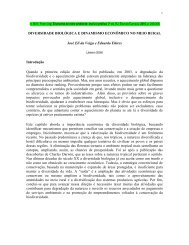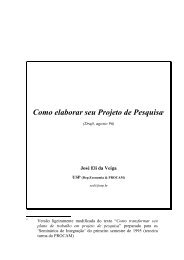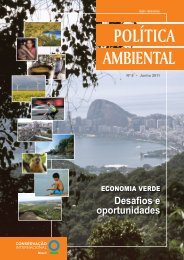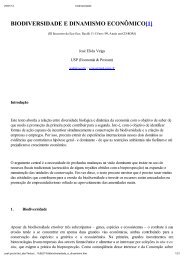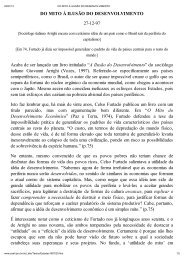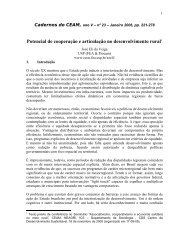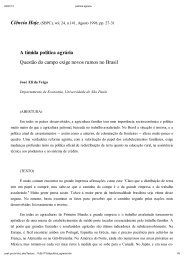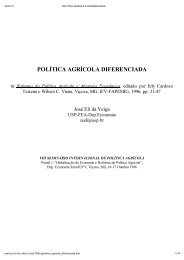sustainable development 20 years on from the ... - José Eli da Veiga
sustainable development 20 years on from the ... - José Eli da Veiga
sustainable development 20 years on from the ... - José Eli da Veiga
You also want an ePaper? Increase the reach of your titles
YUMPU automatically turns print PDFs into web optimized ePapers that Google loves.
69<br />
heads of household in rural areas, and streng<strong>the</strong>ning <strong>the</strong>ir access to land could enable <strong>the</strong>m to improve<br />
<strong>the</strong>ir situati<strong>on</strong> and exert greater influence in <strong>the</strong>ir homes and communities (see box I.6) (FAO, <str<strong>on</strong>g>20</str<strong>on</strong>g>11).<br />
Box I.6<br />
GENDER AND LAND TENURE<br />
Rural women account for <strong>the</strong> bulk of family farm output, yet <strong>the</strong>ir rights are often ignored and <strong>the</strong>ir expertise<br />
underestimated owing to <strong>the</strong> gender biases implicit in many laws, in <strong>da</strong>ily practices and customs, and in <strong>the</strong> sexual<br />
divisi<strong>on</strong> of labour. Only recently have <strong>the</strong>ir key role as food producers and suppliers and <strong>the</strong>ir decisive c<strong>on</strong>tributi<strong>on</strong><br />
to food security in <strong>the</strong> home been acknowledged. In Latin America, <strong>the</strong> distributi<strong>on</strong> of land ownership between men<br />
and women is extremely unequal, with women rarely representing even <strong>on</strong>e fourth of all landowners. The<br />
persistence of this gender gap in ownership would appear to be related to <strong>the</strong> following factors: a dem<strong>on</strong>strated<br />
preference to leave inheritances to men; <strong>the</strong> privileges enjoyed by men within marriage; a tendency to favour men in<br />
community and State-run land distributi<strong>on</strong> programmes; and gender biases in <strong>the</strong> land market, where women are less<br />
likely than men to succeed in purchasing property. Few statistics <strong>on</strong> <strong>the</strong> outcomes of agrarian reform initiatives in<br />
various countries in <strong>the</strong> regi<strong>on</strong> are available, but those that do exist indicate that no more than a small number of<br />
women have benefited <strong>from</strong> <strong>the</strong>se policies, inasmuch as <strong>the</strong>y have received <strong>on</strong>ly, <strong>on</strong> average, 11% or 12% of <strong>the</strong><br />
total amount of land distributed under <strong>the</strong>se programmes (Internati<strong>on</strong>al Land Coaliti<strong>on</strong>, <str<strong>on</strong>g>20</str<strong>on</strong>g>09, in América Latina<br />
Genera, UNDP, <str<strong>on</strong>g>20</str<strong>on</strong>g>10). This situati<strong>on</strong> is attributable to <strong>the</strong> persistence of biases in laws and regulati<strong>on</strong>s, such as, for<br />
example, <strong>the</strong> designati<strong>on</strong> of <strong>the</strong> head of household as <strong>the</strong> recipient of any land title awarded to that household and<br />
<strong>the</strong> pervasive assumpti<strong>on</strong> that male farmers are <strong>the</strong> target group for agrarian policy.<br />
In <strong>the</strong> 1990s, as <strong>the</strong> women’s movement grew in strength, some progress began to be made in attaining greater<br />
gender equality in agrarian law. As a result, some countries’ laws recognize women as rights holders, although most<br />
recognize <strong>the</strong> rights of married couples (joint title) or of individuals, regardless of <strong>the</strong>ir sex. In Chile, Colombia and<br />
Nicaragua, women heads of household have been given priority in land distributi<strong>on</strong> or titling programmes. The main<br />
way that women acquire land titles is still through inheritance, as <strong>da</strong>ughters or widows, however (UNDP, <str<strong>on</strong>g>20</str<strong>on</strong>g>10). Many<br />
countries in <strong>the</strong> regi<strong>on</strong> have yet to introduce <strong>the</strong> agrarian reforms and public policies needed to promote <strong>the</strong> equitable<br />
distributi<strong>on</strong> of land. Progress in guaranteeing women’s and men’s right to land <strong>on</strong> an equal footing is essential in order<br />
to combat rural poverty and to achieve <str<strong>on</strong>g>sustainable</str<strong>on</strong>g> <str<strong>on</strong>g>development</str<strong>on</strong>g> and gender equality.<br />
Source: América Latina Genera/Regi<strong>on</strong>al Centre for Latin America and <strong>the</strong> Caribbean, United Nati<strong>on</strong>s Development<br />
Programme (UNDP), “Desarrollo sostenible”, <str<strong>on</strong>g>20</str<strong>on</strong>g>10 [<strong>on</strong>line] http://www.americalatinagenera.org/es/documentos/<br />
tematicas/tema_desarrollo_sostenible.pdf.<br />
The implicati<strong>on</strong>s of <strong>the</strong> use of genetically modified organisms (GMOs) are closely related to <strong>the</strong><br />
work being d<strong>on</strong>e to up<strong>da</strong>te <strong>the</strong> Internati<strong>on</strong>al C<strong>on</strong>venti<strong>on</strong> for <strong>the</strong> Protecti<strong>on</strong> of New Varieties of Plants of<br />
<strong>the</strong> Internati<strong>on</strong>al Uni<strong>on</strong> for <strong>the</strong> Protecti<strong>on</strong> of New Varieties of Plants (which <strong>da</strong>tes back to 1991) and to<br />
<strong>the</strong> cost of permits for derived varieties, as well as restricti<strong>on</strong>s <strong>on</strong> producers’ propagati<strong>on</strong> of seeds for<br />
<strong>the</strong>ir own use. GMOs do not offer an advantage to small-scale producers because of <strong>the</strong> high cost of<br />
GMO seeds (Diouf, <str<strong>on</strong>g>20</str<strong>on</strong>g>11). State-run germplasm banks could help to encourage research and boost<br />
inventories of nati<strong>on</strong>al varieties at affor<strong>da</strong>ble or subsidized prices (Fresco, <str<strong>on</strong>g>20</str<strong>on</strong>g>01).<br />
Ano<strong>the</strong>r emerging issue that may have an impact <strong>on</strong> food security and <strong>the</strong> sustainability of <strong>the</strong> use<br />
of land and water resources in <strong>the</strong> regi<strong>on</strong> is <strong>the</strong> increasing c<strong>on</strong>centrati<strong>on</strong> and appropriati<strong>on</strong> of land in Latin<br />
American countries. The practice of leasing or selling vast tracts of land to investors <strong>from</strong> <strong>the</strong> regi<strong>on</strong> or<br />
<strong>from</strong> o<strong>the</strong>r countries may provide short-term ec<strong>on</strong>omic growth opportunities for <strong>the</strong> countries of Latin<br />
America and <strong>the</strong> Caribbean, but also has risks: indeed, it may result in land grabs, un<str<strong>on</strong>g>sustainable</str<strong>on</strong>g> use of<br />
natural resources and expulsi<strong>on</strong> of rural populati<strong>on</strong>s (FAO, <str<strong>on</strong>g>20</str<strong>on</strong>g>09).<br />
O<strong>the</strong>r challenges that are taking shape are <strong>the</strong> genetic impoverishment of cultivated plant species<br />
and <strong>the</strong> formati<strong>on</strong> of vast “dead z<strong>on</strong>es” in <strong>the</strong> oceans or o<strong>the</strong>r bodies of water.



